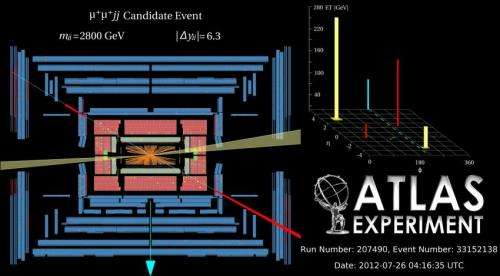Candidate event for WW → WW scattering in the ATLAS detector at the Large Hadron Collider.
(Phys.org) —Summer may be on us (at least in the northern hemisphere) but scientists are still busy conducting research, particularly at the Large Hadron Collider as physicists detect process even rarer than the long-sought Higgs particle—after two years of study they've found evidence of a process that can be used to test the mechanism involved where the Higgs imparts mass to other particles. Also, another team has found that entanglement between particle and wave-like states of light resembles Schrodinger's cat experiment. They found a way to entangle a particle wave and a photon creating a new type of qubit that might be useful for quantum computing and which might also be the closest analogy of Schrödinger's Gedankenexperiment realized so far. Another group working on a test of equivalence principle searches for effects of spin-gravity coupling—they used a quantum sensor to investigate gravitational interaction to test the equivalence principle by comparing the gravitational interaction for a bosonic particle to that of a fermionic particle.
In other physics news, a team at Perimeter Institute for Theoretical Physics considers the question of whether the universe a bubble: . They're looking at a practical approach to multiverse theory, and suggest our own universe might just be one bubble among many—it's all based on cosmic inflation, and the researchers believe it might even be testable. Also, a team of astronomers report Hubble sees a galaxy with a glowing heart—a Seyfert galaxy, that glows in a way similar to the Milky Way.
In more practical news here on Earth, medical researchers are excited about a study that found one injection stops type 2 diabetes in its tracks in mice without side effects. A protein called FGF1 restored blood sugar levels to normal for two days—the team is hopeful that it can do the same for people. Also news from Rutgers University as chemists develop technology to produce clean-burning hydrogen fuel. They suggest they might have found a way to overcome the high cost associated with manufacturing the clean burning fuel.
And finally, food for thought: if you want to change attitudes, don't argue—agree, extremely. A team of researchers found that simply agreeing with people could cause them to change how they felt about something—but only if it was done in a big way. They suggest it might actually be a way to promote peaceful solutions to seemingly intractable problems, such as issues causing all the wars going on in the world.
© 2014 Phys.org
























